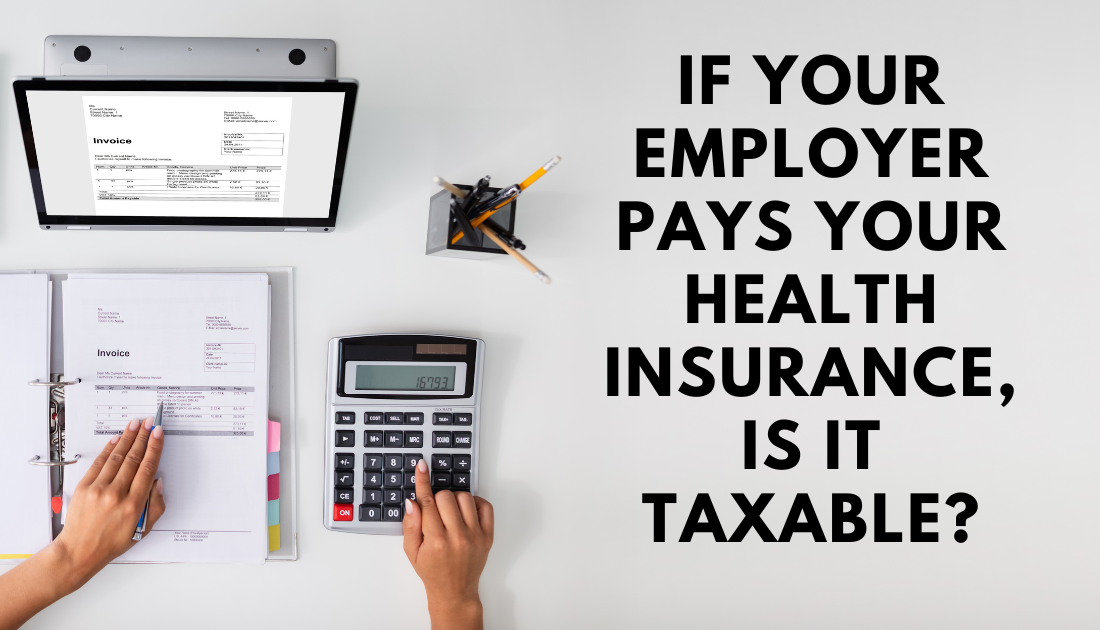If Your Employer Pays Your Health Insurance, is it Taxable?

Just the Essentials...
- Employer-paid healthcare contributions are not tax deductible. However, they also are not taxable, leading to equivalent savings.
- If your out-of-pocket contribution to health insurance exceeds 7.5% of your adjusted gross income, you may be able to deduct your premiums and other insurance costs from your taxes.
- Insurance premiums for COBRA, Medicare, and Marketplace insurance are tax deductible.
Employer-Paid Healthcare is a Sweet Deal
You’ll notice a huge difference if you compare the average Marketplace plan to employer-paid health insurance. Employer-paid plans often have larger networks, lower deductibles, and generally better coverage than a Marketplace plan. That’s because most employer-paid plans are considered group health insurance: a sort of bulk-purchase option that reduces the overall financial risk the insurer faces if you get sick.
Compared to an individual health plan, like the ones offered through the Marketplace, insurance providers are less likely to take a financial hit, so they’re willing to offer more coverage for the same price. With your employer paying the bulk of your premium, these plans become very appealing. However, people used to individual insurance might face some sticker shock: the low-income tax credit offered by the Affordable Care Act does not apply to employer-paid health insurance, even if your total income still qualifies you. Does this mean you’re losing out on a major tax benefit? Not exactly. Your tax savings are still there, they’re just taking on a different form.
Pre-Tax Income
Whenever your employer sends you your paycheck, a portion of your income is taken away as tax. These taxes go to various government services, including disaster relief and infrastructure upgrades, as well as programs like Medicare and Medicaid. The amount of tax you owe primarily depends on your income.
For instance, if you make around $40,000 a year, you owe approximately 12 percent of your income as taxes. The actual math is more complicated and varies depending on the year and other tax breaks you may qualify for. However, only taxable income is counted for this purpose. Most income is taxable, but certain income is exempted from being taxed, such as gifts.
Contributions made to employer-paid health plans fall under this non-taxable category. In the strictest sense, the amount your employer pays for your health insurance is income, and if your employer were contributing to another expense (like a company car) you would owe taxes on them. However, health insurance contributions made by your employer are made pre-tax, meaning they don’t count toward taxable income.
Similarly, any money deducted from your paycheck to cover insurance premiums is also considered pre-tax. This is functionally identical to a tax deduction, as both pre-tax income and tax deductions serve to lower your taxable income, meaning you pay less on taxes overall. You can’t declare employer contributions to health insurance as tax deductions because that would be “double dipping”. You’d be getting two deductions for the same thing. Many other insurance programs, like Health Savings Accounts and Flexible Spending Accounts are also considered pre-tax.
However, there are circumstances where certain healthcare expenses may be tax deductible, even if you get insurance through your workplace.
The 7.5 Percent Rule
Sometimes you can spend more on health insurance than our plan covers. This can result from a new baby, an extended hospital stay, or a dependent falling ill. You might also find that your insurer doesn’t cover certain health services, like dental, vision, or out-of-network care.
If you’ve paid more than 7.5 percent of your taxable income on healthcare expenses that were not reimbursed by your employer or insurance provider, you can claim the amount paid in excess of 7.5 percent from your taxes. For instance, if your total taxable income is $100,000, and you pay $9,500 in medical expenses, you’d be able to take a $2,000 deduction.
Note that the above rules only apply to plans offered through your employer: premiums paid toward individual insurance plans, including Marketplace plans, Medicare, and COBRA, are tax deductible, regardless of how much you spend.
Be aware: these deductions only apply if you choose to itemize your deductions. Most taxpayers choose the standard deduction. Except in extreme circumstances, the standard deduction will save you more money if you have no other itemized deductions. However, you should claim these deductions if they exceed the value of your standard deduction, or if you are otherwise ineligible for the standard deduction.
What If I’m Self-Employed?
If you’re self-employed, you can deduct your health insurance premiums from your taxes, provided you are not eligible for an employer-paid plan through your spouse or another workplace. Self-employed people may write off their insurance premiums even if they are not itemizing their deductions, similar to how beneficiaries of an employee-paid plan aren’t taxed on their contributions. This is considered a personal rather than business expense and should be filed on your individual tax return.
Although you cannot claim employer-paid health insurance as a tax deduction, the pre-tax nature of those payments means they’re essentially deducted for you. Similarly, self-employed individuals can claim a similar benefit through write-offs. Even if you don’t qualify for pre-tax premiums, there are still many ways to save on insurance.
Enter your zip code below to begin comparing insurance plans today, or call one of our licensed insurance agents at (800) 318-9984.
Key Resources:
- What is a health insurance network?
- Why do all health insurance plans have a deductible?
- What is group health insurance?
- What is individual health insurance?
- What is HSA insurance?
- What is a Flexible Spending Account for healthcare? – Health Insurance Providers
- Topic No. 551 Standard Deduction | Internal Revenue Service
- Topic No. 501 Should I Itemize? | Internal Revenue Service
- Are health insurance premiums deductible for self-employed?
